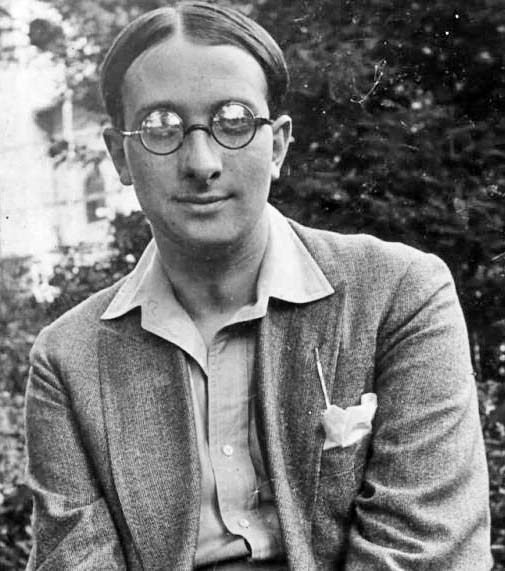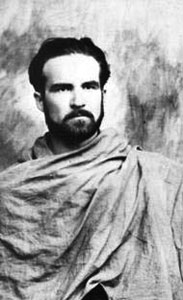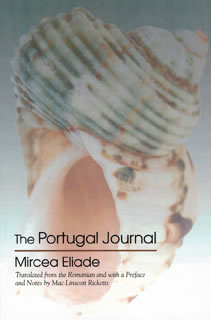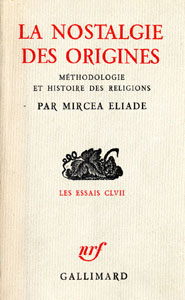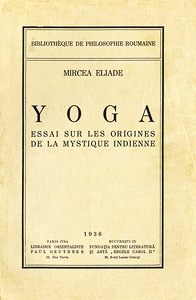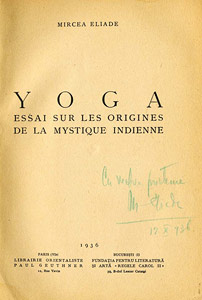Professor Mircea Eliade
Historian of religion, fiction writer, philosopher, and professor at the University of Chicago. He was a leading interpreter of religious experience, who established paradigms in religious studies that persist to this day. His theory that hierophanies form the basis of religion, splitting the human experience of reality into sacred and profane space and time, has proved influential. One of his most influential contributions to religious studies was his theory of Eternal Return, which holds that myths and rituals do not simply commemorate hierophanies, but, at least to the minds of the religious, actually participate in them. In academia, the Eternal Return has become one of the most widely accepted ways of understanding the purpose of myth and ritual. His literary works belong to the fantasy and autobiographical genres. The best known are the novels Maitreyi ("La Nuit Bengali" or "Bengal Nights"), Noaptea de Sânziene ("The Forbidden Forest"), Isabel şi apele diavolului ("Isabel and the Devil's Waters") and the Novel of the Nearsighted Adolescent, the novellas Domnişoara Christina ("Miss Christina") and Tinereţe fără tinereţe ("Youth Without Youth"), and the short stories Secretul doctorului Honigberger ("The Secret of Dr. Honigberger") and La Ţigănci ("With the Gypsy Girls"). Early in his life, Eliade was a noted journalist and essayist, a disciple of Romanian far right philosopher and journalist Nae Ionescu, and member of the literary society Criterion. He also served as cultural attaché to the United Kingdom and Portugal. Several times during the late 1930s, Eliade publicly expressed his support for the Iron Guard, a fascist and antisemitic political organization. His political involvement at the time, as well as his other far right connections, were the frequent topic of criticism after World War II. Wikipedia contributors, 'Mircea Eliade', Wikipedia, The Free Encyclopedia, 9 February 2010, 13:19 UTC, <http://en.wikipedia.org/w/index.php?title=Mircea_Eliade&oldid=342924605> [accessed 28 February 2010]
Foundation Makes Possible Publication of
Time, Death, and the Unspeakable Secret by Mircea Eliade by Istros Books The Foundation is delighted to have been able to contribute to this publication from ISTROS Books which is published on 30 May 2025. This volume consists of six of Eliade’s best short stories, taken from over a 30-year period starting in 1959 with A Fourteen-Year-Old Photograph and culminating with In the Shadow of a Lily, the last story Eliade is known to have written. Each of these stories is dense with allusions and interwoven with connections and references drawn from the imagination and vast knowledge of a great man. Who knows what secrets they may conceal? One thing is for sure - they will repay repeated close reading, but will also charm on the first encounter. Click here to enlarge
Foundation Makes Possible Publication of
The Portugal Journal by Mircea Eliade by the State University of New York Press Eliade served as a diplomat for his country for several years. His journal kept during World War II when he was posted in Lisbon at the Romanian Legation has been translated from the Romanian by Professor Mac Linscott Ricketts, and is published in April 2010 by the State University of New York (SUNY) Press in the USA. This publication has been subsidised by the Prodan Foundation, to enable translations of key primary source documents of the period, which have never before been made public, to be included. Eliade’s journal and papers for this period fill a hole in our knowledge of the secret political, diplomatic, and espionage intrigues taking place in Lisbon during the Second World War. All historians of the period will find this material useful, and Eliade enthusiasts will be fascinated to learn of the author and scholar’s intimate involvement in such exciting events of his time. Click here to enlarge and view reverse cover (PDF Coppola's Youth Without Youth
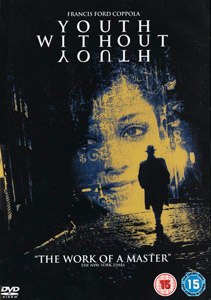 DVD cover of the 2007 film of Eliade's novel YOUTH WITHOUT YOUTH, directed by Francis Ford Coppola. Click here for the IMDB page
|
|||||||||||||||
 |
|
||
|
|||
